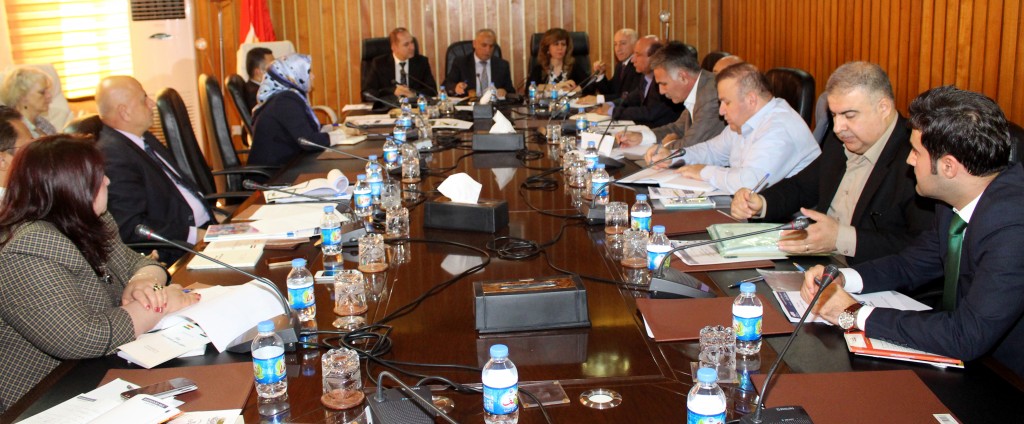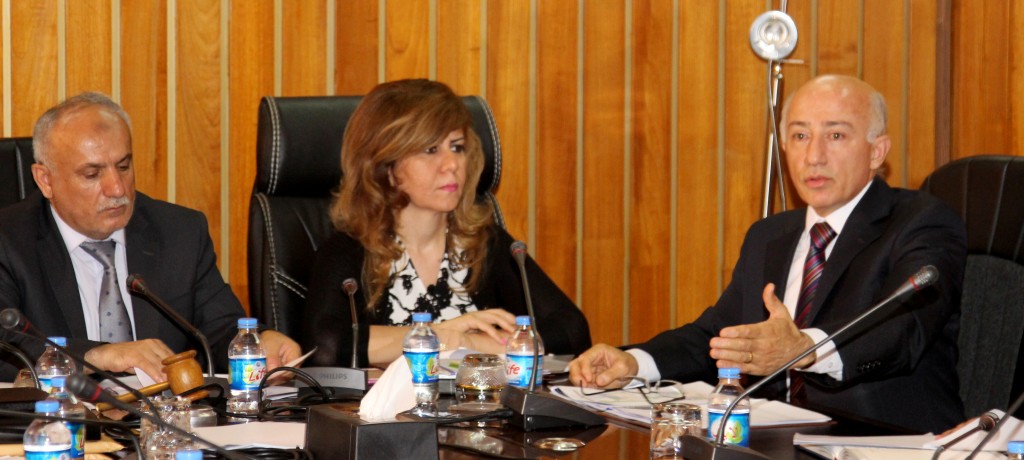Giving minorities in the Kurdistan region more influence, they should get their own special councils of representatives to function within the Kurdish parliament and governing institutions.
That is the essence of a plan presented to the Constitutional Commission of the Kurdistan Parliament by Middle East Research Institute (MERI) President and former Minister Dlawer Ala’Aldeen.
Inspired by Eastern European bodies for minorities but adjusted to the Kurdish situation, two new councils will ensure the active participation of the different ethnic and religious elements in legislation, decision-making, implementation and monitoring, he predicted.
MERI based its plan on meetings with minority groups and NGOs, in relation to the fact that a special committee is presently working on the first draft of the Kurdish constitution, said Dlawer. “As the committee is in the middle of covering the minorities’ rights, they invited us in. We might have influence on some of their decisions on structuring articles in the constitution.”
What is lacking in the present Kurdish system, he said, is “a model that integrates the minorities’ representatives within the parliament as well as governmental institutions, so they can lobby and influence decisions at the right time in the right places.”
Two commissions should be formed: one for ethnic minorities such as Turkmen, Arabs, Assyrians, Chaldeans and Armenians, and another for religious minorities like Yezidis, Christians, Kaka’is, Zoroastrians, Sabians and Baha’is. The councils should be embedded administratively and financially within the Kurdistan Parliament.
They will be made up of members of parliament, representatives of 11 ministries and ministers or their deputies—all member of minority groups themselves.
To make sure they will have real influence, they will not only work within the parliament, but will also send an observer to the meetings of the Council of Ministers. To prevent fights over the most influential positions, the observer in the cabinet will be chosen in rotation.
“At the moment there is no way for legislators to know, and then to influence how these decisions are implemented. But this new body will ensure they have eyes everywhere, and the power of lobbying and shaping decisions at the macro and micro levels,” Dlawer said.
He stressed that this plan is not meant to add still more bureaucracy to the system in Kurdistan. As most of the members of the councils already have jobs and incomes, the cost of implementing the plan is small.
“They are like a group of lobbyists, defined by the law, within the parliament, with minimal bureaucratic procedures—just the secretarial support that they need. Minimum bureaucracy and minimum budget,” Dlawer said.
In making the plan, the MERI-team adapted an Eastern European concept to the situation in Kurdistan. “There they work within the parliament, but don’t have teeth in the government. It’s not good for Kurdistan, as decision making here is done outside the parliament. We brought that together into a model that is tailor-made for Kurdistan, to influence decisions on all levels,” Dlawer said.
The plan was met with enthusiasm by the members of the parliament who occupy the 11 seats reserved there for minorities. The Constitutional Commission received it positively, pointing out that it will have to be discussed both in the commission itself and the factions in the parliament before any decision can be made.
Though MERI proposed two separate councils, Srood Maqdasy, an Assyrian member of the Kurdistan Parliament, asserted that to start with, one council for all ethnic and religious groups should be sufficient. “In the future we can make it two, but for the time being one is enough,” Maqdasy said.

Otherwise, he totally supports the plan. “We have laws and legislation concerning the protection of the rights of minorities, but there are problems in implementing for instance those related to land property, students and native languages. The Council of Ministers was neglecting these issues. Our new council will play a major role in solving these problems, and will have the power to negotiate directly with the presidency and the Council of Ministers,” Maqdasy added.
Minorities now feel their voice is not heard. Maqdasy complained about “a feeling of superiority” amongst his colleagues, and also Turkmen MP Aydin Maruf mentioned “doubts about our participation in the political system.”
An earlier draft on minority issues ended up being so diluted by political bargaining that most of the demands of representatives of the different groups were scrapped. “Of the 73 articles that were approved, none of them mirrored our demands,” Maruf said.
To further improve the representation, MERI also proposes to increase the quotas for minorities in the parliament, on top of the present 11 seats, with extra seats for Yezidis, Arabs, Kaka’is and others.
But Dlawer stressed that if the so-called disputed areas, like the Yezidi Shingal and the predominantly Christian Nineveh Plains, eventually are added to the Kurdistan Region as the Kurds demand, this representation needs to be changed again. “Some of the minorities are of course majorities in those areas,” he said.
By: Judit Neurink on Rudaw.net / English
Related Media:
* * * * *
About MERI: The Middle East Research Institute is Iraq’s leading policy-research institute and think tank. It is an independent, entirely grant-funded not-for-profit organisation, based in Erbil, Kurdistan Region. Its mission is to contribute to the process of nation-building, state-building and democratisation via engagement, research, analysis and policy debates.
MERI’s main objectives include promoting and developing human rights, good governance, the rule of law and social and economic prosperity. MERI conduct high impact, high quality research (including purpose-based field work) and has published extensively in areas of: human rights, government reform, international politics, national security, ISIS, refugees, IDPs, minority rights (Christians, Yezidis, Turkmen, Shabaks, Sabi mandeans), Baghdad-Erbil relations, Hashd Al-Shabi, Peshmarga, violence against women, civil society. MERI engages policy- and decision-makers, the civil society and general public via publication, focused group discussions and conferences (MERI Forum).


